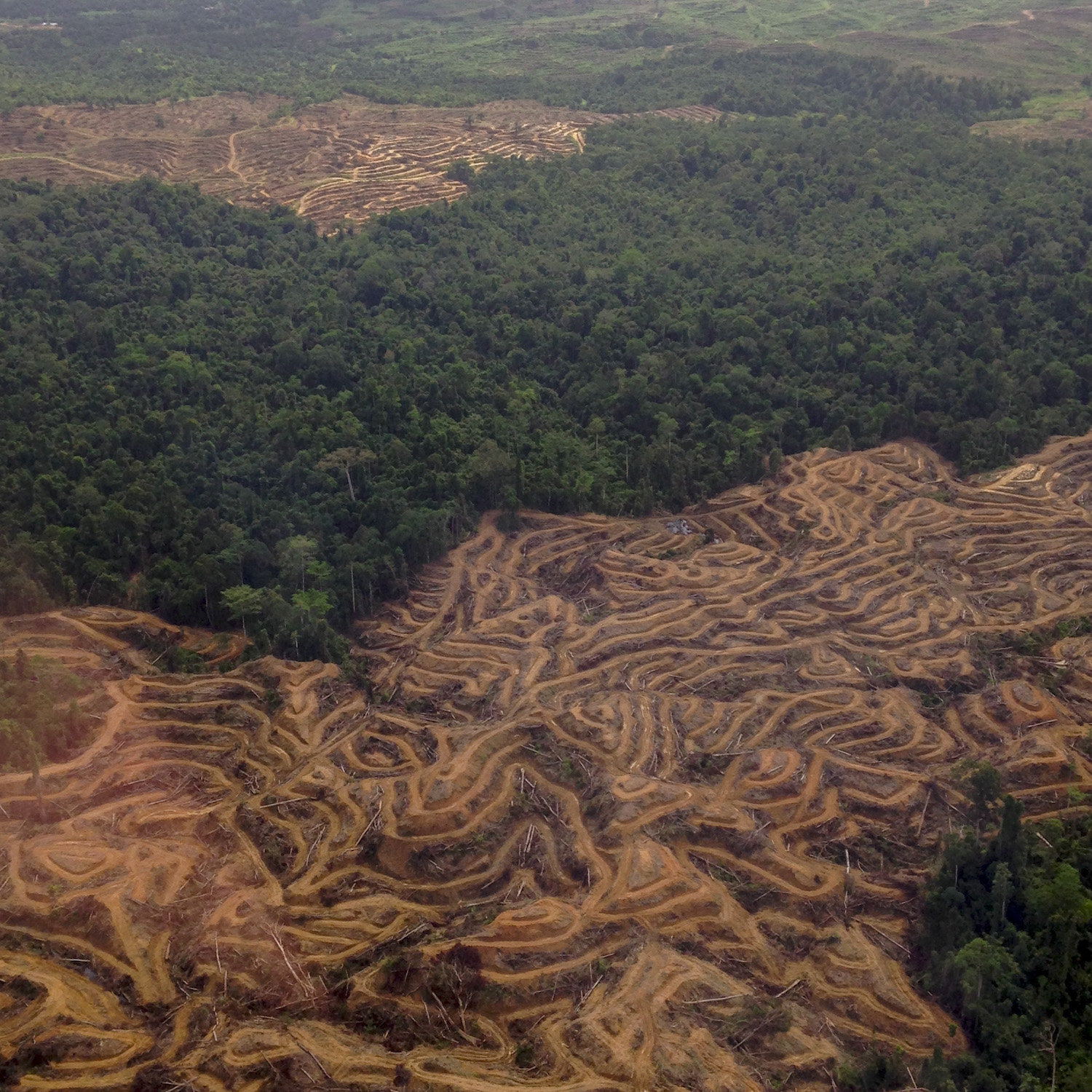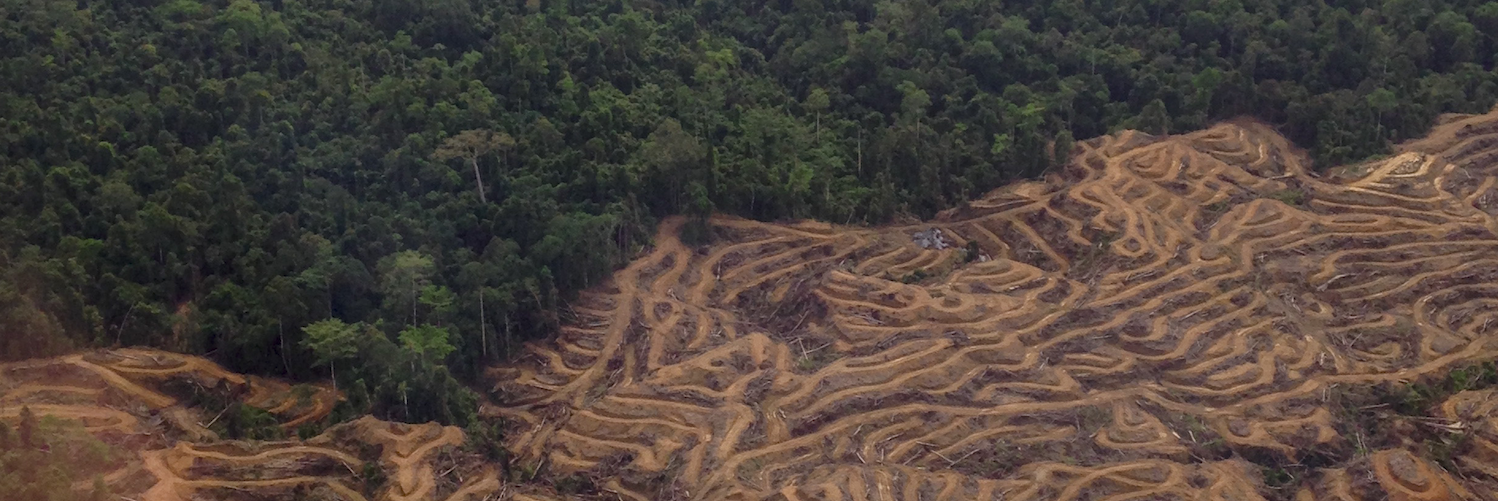My feet are now firmly on the ground, but just a short time ago I was flying over the lowlands of the Leuser Ecosystem on the island of Sumatra in Indonesia. The coastline is hugged by a few big cities, towns and smaller villages, home to communities that rely on the surrounding rice fields for food and livelihoods. As we travelled inland from the North Sumatra coastline, the landscape began to change.
Soon the rice fields were surrounded by a patchwork of smallholder palm oil farms, easily distinguished by their small size and the houses dotted within them. Community gardens were visible from the sky using intercropping practices that guarantee long-term food supplies. As we travelled further toward to towering mountains of the Leuser Ecosystem the plantations grew in size and began to dominate the landscape. The shift to industrial scale oil palm development was clearly visible. Plumes of smoke soon rose from the mills built to process fruit from the oil palm trees into the crude palm oil now found in 50% of products sold in grocery stores across the planet.
Palm oil has been grown in North Sumatra for decades, and its impact can easily be seen from the sky. The lowland rainforests that once spread across the flat lands between the Leuser Ecosystem and the coast have been cleared and all that remains is a thin ribbon of forests on the foothills of the mountains and patches of forests on steep slopes surrounded by oil palm plantations. It is a tragedy to think of what has been lost, but there is some cause for hope.

Active clearing by Mopoli Raya in the lowland rainforest of the Leuser Ecosystem, Aceh, Indonesia. June 2015
As we fly over the boundary into Aceh the picture is still dire but, before long, a magnificent stretch of lowland rainforests appears. These lowland rainforests are part of a 6.5 million acre biodiversity hotspot known as the Leuser Ecosystem. The Leuser Ecosystem is a rich and verdant expanse of intact tropical lowland rainforests, cloud draped mountains and steamy peatland swamps. It is among the most biodiverse and ancient ecosystems ever documented by science, and it is the last place where Sumatran orangutans, elephants, tigers, rhinos and sun bears still roam side by side.
Despite being protected under Indonesian national law, massive industrial development for palm oil, pulp and paper plantations and mining threaten the entire ecosystem, as well as the continued wellbeing of the millions of Acehnese people who depend on it for their food, water and livelihoods. The boundary of the Leuser Ecosystem is stark and scars of recent clearing show that if action is not taken these last lowland rainforests will be lost…soon.
We simply can not lose the lowlands of the Leuser Ecosystem. These forests are the last hope for the survival of not only the Sumatran orangutan, but also the last Sumatran rhinos, tigers and elephants. The range of these megafauna has been dramatically reduced and now the only lowland forests they can migrate through are on the chopping block for palm oil expansion.
This is an all-hands-on-deck moment. A moratorium on the clearance of these priceless rainforests for new plantations is desperately needed. You can help us protect the Leuser Ecosystem by taking action today.
Activists, civil society, consumers, governments, and corporate players in the palm oil sector including the palm oil growers and traders to the big brands in the Snack Food 20 and the Consumer Goods Forum must come together to find a way to protect the lowland rainforests of the Leuser Ecosystem.
Rainforest Action Network continues to call on the three biggest traders of palm oil from this region—Wilmar, Golden Agri Resources and Musim Mas—to enforce a moratorium on the clearance of forests inside the Leuser Ecosystem. Recent progress reports show that these palm oil giants have begun taking action by engaging with their suppliers with operations that threaten the Leuser Ecosystem. This is a good first step, but more needs to be done to secure commitments from their suppliers to halt the clearance of forests and peatlands in this precious ecosystem.
In our last publication Testing Commitments, RAN exposed laggards in the Snack Food 20 that have failed to take the first step to address their Conflict Palm Oil problem by adopting a time-bound responsible palm oil policy. We are putting all 20 companies to the test and will hold them to account if they too fail to enforce a moratorium in their global supply chains, especially in the Leuser Ecosystem.
We are making real progress, but bulldozers continue to destroy these priceless rainforests in the Leuser Ecosystem. More action is urgently needed.
With your continued support, we will expose the culprits that are destroying the Leuser Ecosystem for palm oil and will work to drive a lasting solution for Aceh, its people and one of its most precious assets: The Leuser Ecosystem.
Long live the Leuser.
